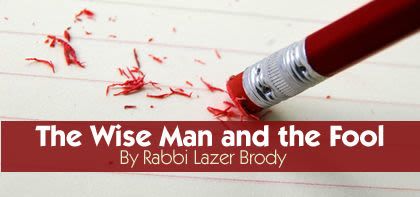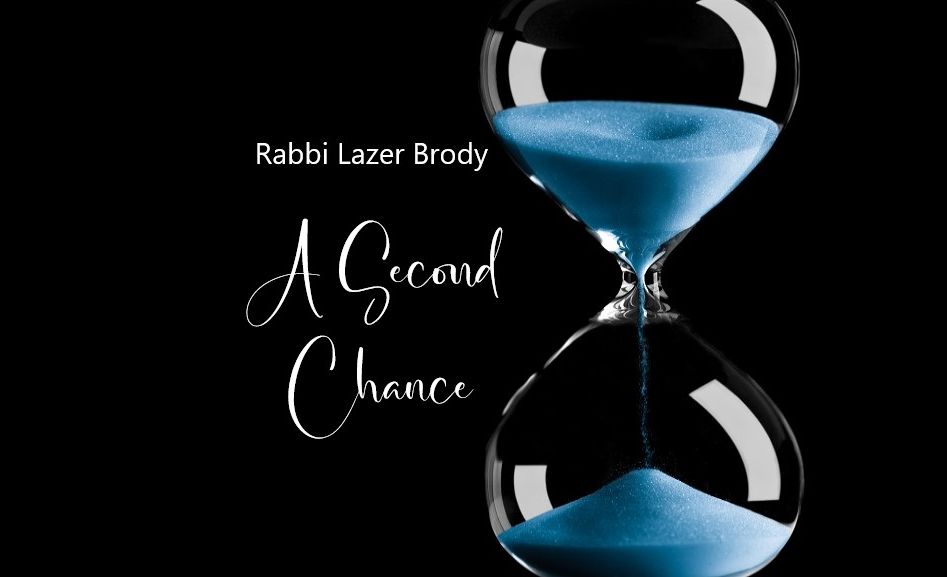
The Wise Man and the Fool
Everybody makes mistakes, even the greatest tzaddikim. Hashem doesn't punish a person for making a mistake; He waits to see what we do after making the mistake…

Everybody makes mistakes from time to time, even the greatest tzaddikim. That’s why King Solomon – the wisest man who ever walked the face of the earth – teaches us in Ecclesiastes that there’s no such thing as a tzaddik who is completely free of sin. With this in mind, we can really encourage ourselves by remembering Hashem’s limitless compassion. Hashem doesn’t punish a person for making a mistake. Hashem allows a person to make a mistake so that the individual will learn that there’s still much room for improvement. Hashem also gives us the opportunity to improve. We therefore reach a simple but most encouraging conclusion, which our sages say explicitly: Hashem doesn’t punish a person for making a mistake; He waits to see what we do after making the mistake.
The above concept puts a nail in the coffin of the notion that Judaism is stern judgments, hellfire, and brimstone, Heaven forbid. Those who teach, preach or practice such Judaism are far from the truth. Even the  holy Torah codifies the concept of “the second chance” in the form of two important d’oraita (explicit Torah) mitzvot – teshuva and Pesach Sheni.
holy Torah codifies the concept of “the second chance” in the form of two important d’oraita (explicit Torah) mitzvot – teshuva and Pesach Sheni.
Teshuva is such an amazing mitzvah that many people find difficulty in believing that it’s for real. Many an email asks me, “Does Hashem really forgive me for what I did?” The simple, categorical and indisputable answer is a resounding and emphatic yes! It doesn’t matter what you did or how serious the Torah regards the transgression. Not only does Hashem forgive, but he loves us and trusts us enough to give us a second chance. As soon as we learn from a mistake and do our very best to avoid repeating it in the future, we are totally forgiven. Our slate is wiped clean! Hashem grants a moratorium on all our spiritual debts, provided that we do daily self-assessment, admit our mistakes, and do our very best to correct them and/or avoid repeating our mistakes in the future.
Imagine that you failed to pay income tax for the last twenty years, and you owe the IRS back taxes that total a million dollars! You go before the head of IRS who is fully capable of throwing the book at you if he so desires. Yet, he’s kind, attentive, and understanding about everything you have to say in defense of yourself. Yet, despite your excuses for not having paid income tax for the last two decades, you still owe the money and are legally liable to pay it in full, or else…
Got the picture? Now imagine that the head of IRS offers you a proposal” “OK,” he says, “I’m willing to wipe your slate clean of the $1,000,000 dollars in back debts. All you have to do is to begin paying your income tax on a monthly basis from this moment on. Do you agree?”
Your head is spinning. What?! Such compassion!? Of course you agree! You take out your pen and you sign the commitment right away. You’ve just saved a million dollars and time behind bars…
A fantasy? No way – that’s just how teshuva works. In fact, that’s low-level teshuva, the teshuva out of fear. The Gemara says that if a person makes teshuva out of love, his transgression becomes a merit. That means that instead of paying a million-dollar fine, you get a check for a million dollars.
The Evil Inclination and the heresy of modern society have been giving Hashem, Torah, and mitzvot terrible publicity. Teshuva really is umpteen times better than winning the Irish Lottery.
There’s even more proof to what we’re saying right in the Torah. The Torah has a mitzvah called Pesach Sheni, or “Second Pesach”. During the time of the Holy Temple, anyone who fails to participate in the Pascal sacrifice is punished by karett, a terrible punishment that amounts in the severance of a person’s soul from the Jewish people. Yet, a person who was far away from the Holy Temple or ritually impure on the afternoon of 14th of Nissan, when we prepare the Pascal Lamb Sacrifice that we partake of on Seder night, the eve of the 15th of Nissan, is given a second chance. Hashem invites all those who were “ritually impure” and “far away” to return to the Holy Temple a month later on the 14th of Iyar. They fulfill the obligation of “Pesach Sheni” – the national second chance – and are completely forgiven for missing Pesach Rishon, the first Pesach.
“Ritually impure” and “far away” alludes to those of us who were born into non-observant families.
Many middle-aged so-called “secular” Jews (there’s really no such thing) tell me, “How do you expect me to change my lifestyle at fifty or sixty? If Hashem would have wanted me to be observant, He’d have put me in Williamsburg or Bnai Brak. Besides, I’m a good person as it is – I don’t need teshuva!” Nothing could be further from the truth.
Without learning what the Torah demands from us and without doing daily self-assessment, a person is liable to make hundreds of mistakes every day. For example, speaking in a derogatory manner about a person – even if it’s true – is still a heinous transgression of Torah. Eating lettuce that hasn’t been checked for bugs could lead to multiple transgressions with one fell swoop. Paying more for an article when purchasing on an installment plan that the price when paying cash is usury, also a serious violation of Torah.
Hashem will ask each of us on Judgment Day: Why didn’t you accept My gift of the second chance?
The difference between a wise man and a fool is a subtle one: they both make mistakes, yet the wise man learns from his mistakes while the fool ignores them.
Let’s not be fools. Looking all around us, even a blind and deaf man can discern Hashem’s multiple wake-up calls. Let’s not be complacent. Let’s accept Hashem’s second chance while we still can.











5/01/2012
More for ‘pls explain’ In addition, by buying on the installment plan, much interest is added which is a prohibition of Jewish Law. One ends up paying much more than the worth of the article.
5/01/2012
In addition, by buying on the installment plan, much interest is added which is a prohibition of Jewish Law. One ends up paying much more than the worth of the article.
4/30/2012
for pls explain Paying on the installment plan is debt. Debtor is slave to the lender (proverbs 22).